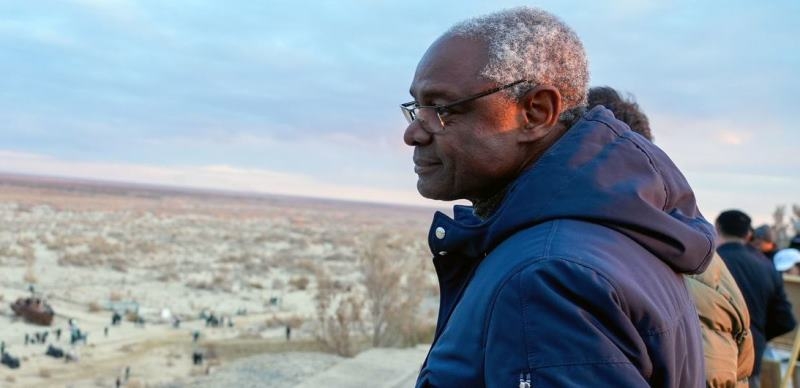- Stocks end week sharply lower as DSE, CSE indices tumble |
- 'Not all collections in the road transport sector is extortion': Sk Rabiul |
- Zubaida, Zaima take iftar with orphan students |
- Dhaka ranks second among world’s most polluted cities Friday |
- Dhaka to maintain ties with all countries with dignity |
Sustainable energy offers hope in fight against desertification, land loss

UNCCD Executive Secretary Ibrahim Thiaw visits the Aral Sea in Uzbekistan, which is suffering the effects of drought. UNCCD
17 June 2024 - Sustainable sources of energy, including solar and wind power, can help communities across the world to reverse desertification and land loss, according to Ibrahim Thiaw, the Executive Secretary of the UN Convention to Combat Desertification.
Mr. Thiaw spoke to UN News ahead of the World Day to Combat Desertification and Drought, marked annually on 17 June
Ibrahim Thiaw: Desertification is happening at the local level as much as it is global. Unless we address this at the local level, we will never be able to actually control it at the global level. Global policies and global decisions are needed.
The impacts are huge in terms of food security and food sovereignty.
It also drives forced migration. If people can no longer produce food on their land then they will migrate. As we have seen for example in the Sahel or Haiti, there can be severe consequences for global security. When people fight over access to land and water, it leads to more conflicts. We are seeing more of this, and it has consequences on the homogeneity of communities and on national economies.
It is estimated that up to 50 per cent of the global GDP might lost by 2050 due to challenges with agriculture and food production unless we address the issue of land loss and desertification.
UN News: What is the trend right now in terms of land loss?
Ibrahim Thiaw: Land loss is happening all over the world and land degradation is affecting both arid and less arid lands.
But in terms of drylands and desertification, it is estimated that 45 per cent of the land surface is affected by desertification. Maybe it is more striking to say that 3.2 billion people or one third of the world population are affected by that.
Every year a hundred million hectares of land is being degraded, an area the size of Egypt. We need to halt land degradation, but we also need to restore 1.5 billion hectares of land.
UN News: How are you going to do that?
Ibrahim Thiaw: By improving the techniques of agriculture, reducing the impact we are having on land in terms of extraction of minerals and other extractive industries. It is also important that we reduce the pressure in terms of people activities in some parts of the world so as to diversify the economy and create more opportunities to create income.
Restoring degraded land is not an expensive activity to undertake, but it is absolutely essential to provide more food security and to reduce conflicts. Every single dollar invested in land restoration can generate up to $30 in economic benefits, so investment in restoration activities is quite profitable from the economic point of view.
This is not just the responsibility of local communities but also of governments and crucially of the private sector because the largest driver of land use in the world is big agriculture.
UN News: Are we talking mainly about small developing countries?
Ibrahim Thiaw: No. It's a global phenomenon that is affecting all countries including the United States, India, China, India or Pakistan.
But the impact is much more severe in small countries, and small economies that do not have reserves, nor the insurance systems to protect their people. And the level of vulnerability is much higher in communities whose revenues are only based on the income they can generate from land.
UN News Desertification doesn't exist in isolation. How does it relate to climate change?
Ibrahim Thiaw: Desertification is an amplifier of climate change. Climate change is an amplifier of desertification because of course, with extreme events, you also have severe impact on land and on communities and local economies. – UN News

